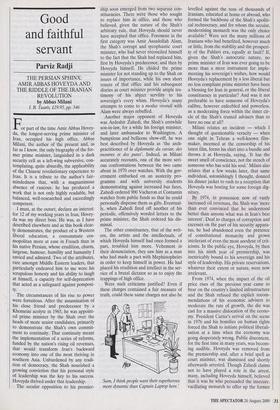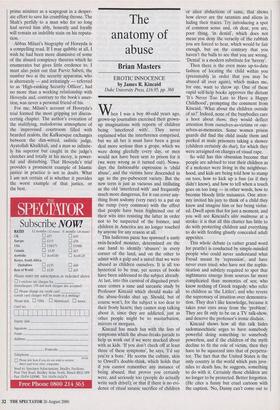Good and faithful servant
Parviz Radji
THE PERSIAN SPHINX: AMIR ABBAS HOVEYDA AND THE RIDDLE OF THE IRANIAN REVOLUTION by Abbas Milani I. B. Tauris, £19.95, pp. 346 or part of the time Amir Abbas Hovey- da, the longest-serving prime minister of Iran, occupied his high office, Abbas Milani, the author of the present and, as far as 1 know, the only biography of the for- mer prime minister, languished in a dark security cell as a left-wing subversive, con- templating, quite absurdly, the applicability of the Chinese revolutionary experience to Iran. It is a tribute to the author's fair- mindedness that, with a magnanimous absence of rancour, he has produced a work that is not only highly readable, but balanced, well-researched and exceedingly competent.
I must, at the outset, declare an interest: for 12 of my working years in Iran, Hovey- da was my direct boss. He was, as I have described elsewhere and as this book clear- ly demonstrates, the product of a Western liberal education, a consummate cos- mopolitan more at ease in French than in his native Persian, whose erudition, charm, largesse, humour, humility and humanity I envied and admired. Two of the attributes, rare amongst Middle Eastern leaders, that particularly endeared him to me were his scrupulous honesty and his ability to laugh at himself, a capacity for self-deprecation that acted as a safeguard against pomposi- ty.
The circumstances of his rise to power were fortuitous. After the assassination of his close friend and predecessor by a Khomeini acolyte in 1965, he was appoint- ed prime minister by the Shah over the heads of more senior candidates, primarily to demonstrate the Shah's own commit- ment to continuity. That continuity meant the implementation of a series of reforms, funded by the nation's rising oil revenues, that would transform Iran's backward economy into one of the most thriving in southern Asia. Unburdened by any tradi- tion of democracy, the Shah nourished a growing conviction that his personal style of leadership was the key to his success. Hoveyda thrived under that leadership.
The secular opposition to his premier- ship soon emerged from two separate con- stituencies. There were those who sought to replace him in office, and those who believed, given the nature of the Shah's arbitrary rule, that Hoveyda should never have accepted that office. Foremost in the first category was Amir Assadollah Alam, the Shah's corrupt and sycophantic court minister, who had never reconciled himself to the fact that the Shah had replaced him, first by Hoveyda's predecessor, and then by Hoveyda himself. He chided the prime minister for not standing up to the Shah on issues of importance, while his own short tenure of that office and his subsequent diaries as court minister provide ample tes- timony of his abject servility to his sovereign's every whim. Hoveyda's many attempts to come to a modus vivendi with Alam were always rebuffed.
Another major opponent of Hoveyda was Ardeshir Zahedi, the Shah's erstwhile son-in-law, for a while his foreign minister, and later ambassador to Washington. A bumptious and bellicose show-off, he was best described by Hoveyda as 'the arch- practitioner of la diplomatic du caviar, des montres et des putes' . Indeed, as Milani accurately recounts, one of the more seri- ous confrontations between the two came about in 1970 over watches. With the gov- ernment embarked on an austerity pro- gramme and with university students demonstrating against increased bus fares, Zahedi ordered 900 Vacheron et Contantin watches from public funds so that he could personally dispense them as gifts. Eventual- ly, when Zahedi fired off another of his periodic, offensively worded letters to the prime minister, the Shah ordered his dis- missal.
The other constituency, that of the writ- ers, the artists and the intellectuals, of which Hoveyda himself had once formed a part, troubled him more. Vehement in their denunciation, they saw him as a man who had made a pact with Mephistopheles in order to keep himself in power. He had placed his erudition and intellect in the ser- vice of a brutal dictator so as to enjoy the trappings of high office.
Were such criticisms justified? Even if these charges contained a fair measure of truth, could these same charges not also be
`Sam, I think people want their superheroes more dynamic than Captain Laptop here.' levelled against the tens of thousands of Iranians, educated at home or abroad, who formed the backbone of the Shah's apoliti- cal technocracy, and for whom the secular, modernising monarch was the only choice available? Were not the many millions of Iranians who had benefited, however much or little, from the stability and the prosperi- ty of the Pahlavi era, equally at fault? If, given the Shah's autocratic nature, no prime minister of Iran was ever going to be more than a mere instrument for imple- menting his sovereign's wishes, how would Hoveyda's replacement by a less liberal but no less compliant prime minister have been a blessing for Iran in general, or the liberal constituency in particular? And was it not preferable to have someone of Hoveyda's calibre, however enfeebled and powerless, as a moderating force within the inner cir- cle of the Shah's trusted advisers than to have no one at all?
Milani relates an incident — which I thought of questionable veracity — when one night in Tehran a well-known film- maker, incensed at the censorship of his latest film, forms his shirt into a bundle and throws it at Hoveyda, saying, 'It has the sweet smell of conscience, not the stench of someone who has sold his soul.' Milani also relates that a few weeks later, that same individual, astonishingly I thought, donned his dinner jacket to rush to a reception that Hoveyda was hosting for some foreign dig- nitary.
By 1974, in possession now of vastly increased oil revenues, the Shah was 'more than ever convinced that he understood better than anyone what was in Iran's best interest'. Deaf to charges of corruption and excesses on the part of his security appara- tus, he had abandoned even the pretence of constitutional monarchy and grown intolerant of even the most anodyne of crit- icisms. In the public eye, Hoveyda, by then into his ninth year of premiership, was inextricably bound to his sovereign and his style of leadership. His private reservations, whatever their extent or nature, were now irrelevant.
From 1974, when the impact of the oil price rises of the previous year came to bear on the country's limited infrastructure and the Shah refused the explicit recom- mendations of his economic advisers to moderate the rate of growth, the die was cast for a massive dislocation of the econo- my. President Carter's arrival on the scene in 1976 and his homilies on human rights forced the Shah to initiate political liberali- sation at a time when the economy was going desperately wrong. Public discontent, for the first time in many years, was becom- ing audible. Hoveyda was removed from the premiership and, after a brief spell as court minister, was dismissed and shortly afterwards arrested. Though Zahedi claims not to have played a role in the arrest, many, including Hoveyda himself, believed that it was he who persuaded the insecure, vacillating monarch to offer up the former prime minister as a scapegoat in a desper- ate effort to save his crumbling throne. The Shah's perfidy to a man who for so long had served him ably, honestly and loyally will remain an indelible stain on his reputa- tion.
Abbas Milani's biography of Hoveyda is a compelling read. If I may quibble at all, I wish he had been more dismissive of some of the absurd conspiracy theories which he enumerates but gives little credence to. I must also point out that Parviz Sabeti, the number two at the security apparatus, who is alternately — and irritatingly — referred to as 'High-ranking Security Officer', had no more than a working relationship with Hoveyda and, contrary to the book's asser- tion, was never a personal friend of his.
For me, Milani's account of Hoveyda's trial formed the most gripping yet discon- certing chapter. The author's evocation of the stultifying, malodorous atmosphere of the improvised courtroom filled with bearded zealots, the Kafkaesque exchanges between the dim-witted, sadistic judge, Ayatollah Khalkhali, and a man so infinite- ly his superior but caught in the judge's clutches and totally at his mercy, is power- ful and disturbing. That Hoveyda's trial provides a prominent example of Islamic justice in practice is not in doubt. What I am not certain of is whether it provides the worst example of that justice, or the best.



























































 Previous page
Previous page